
Contributions of the Astronomical Observatory Skalnate Pleso
metrics 2024
Illuminating the Heavens: A Platform for Astronomical Innovation
Introduction
Contributions of the Astronomical Observatory Skalnate Pleso, published by the Slovak Academy of Sciences Astronomical Institute, serves as a vital platform for the dissemination of research in the realm of Astronomy and Astrophysics. With its ISSN number 1335-1842 and E-ISSN 1336-0337, this esteemed journal aims to foster scientific discourse and innovation among researchers, professionals, and students alike. Although it currently holds a Q4 quartile ranking in its field as of 2023, the journal encourages contributions that enhance our understanding of universe dynamics and celestial phenomena through rigorous research methodologies. Spanning from its inaugural year in 2007 to the projected continuation through 2024, it integrates local insights from Slovakia with broader international endeavors in astronomy. The journal promotes an open-access approach, providing scholars unrestricted access to valuable findings and discussions, thereby advancing the boundaries of astronomical knowledge.
Metrics 2024
 0.20
0.20 0.40
0.40 0.30
0.30 13
13Metrics History
Rank 2024
Scopus
IF (Web Of Science)
JCI (Web Of Science)
Quartile History
Similar Journals
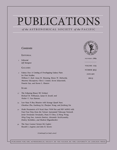
PUBLICATIONS OF THE ASTRONOMICAL SOCIETY OF THE PACIFIC
Charting New Territories in Astronomy and BeyondPublications of the Astronomical Society of the Pacific is a prestigious journal dedicated to advancing the fields of Astronomy and Astrophysics, as well as Space and Planetary Science. Published by IOP Publishing Ltd, this influential journal plays a critical role in disseminating groundbreaking research and innovative findings. With an impressive Q1 ranking in both related categories according to the 2023 metrics, it is recognized among the top journals in its field. As a vital resource for researchers, professionals, and students alike, the journal covers a range of topics relevant to current astronomical research from 1996 to 2024. Although it does not offer open access options, the journal is highly regarded in academic circles, evidenced by its competitive ranking in Scopus—20th in Astronomy and Astrophysics and 26th in Space and Planetary Science. This commitment to excellence ensures that it remains an essential platform for sharing the latest insights in the ever-evolving universe.
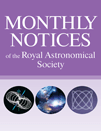
MONTHLY NOTICES OF THE ROYAL ASTRONOMICAL SOCIETY
Fostering Innovation in the Study of Celestial Phenomena.The MONTHLY NOTICES OF THE ROYAL ASTRONOMICAL SOCIETY (MNRAS), published by Oxford University Press, serves as a premier platform for the dissemination of significant research in the fields of Astronomy, Astrophysics, and Space and Planetary Science. Established in 1913 and with an impressive impact factor reflected in its 2023 Q1 rankings—13th in Earth and Planetary Sciences and 14th in Physics and Astronomy—this journal is renowned for its rigorous peer-reviewed articles, fostering advancements in our understanding of the universe. Researchers, professionals, and students alike benefit from its rich content, which spans a vast array of topics within its scope, from stellar dynamics to planetary formation. While the journal does not currently offer Open Access options, the scholarly contributions published herein are invaluable for pushing the boundaries of contemporary scientific inquiry and ensuring that the latest findings reach an engaged audience globally.

Bulgarian Astronomical Journal
Fostering Collaboration in Celestial DiscoveriesThe Bulgarian Astronomical Journal, published by the BULGARIAN ACADEMY OF SCIENCES, INSTITUTE OF ASTRONOMY, serves as a vital platform for the dissemination of research in the field of Astronomy and Astrophysics. With the ISSN 1313-2709 and E-ISSN 1314-5592, this journal has been pivotal in showcasing original studies and advancements in astronomical sciences from 2014 and will continue to do so through 2025. Although categorized in Q4 within the ambit of Astronomy and Astrophysics, it provides essential insights and innovative findings, making significant contributions to the global academic community. Positioned in the lower quartile of Scopus rankings, recognized as #87 out of 90, it offers an opportunity for burgeoning researchers and seasoned professionals alike to engage with emerging ideas and trends in the discipline. While it currently does not feature an open access model, readers and contributors can anticipate a rich exchange of scientific knowledge that fosters collaboration within the astronomy community.

Serbian Astronomical Journal
Engaging Minds in the Quest for Cosmic KnowledgeSerbian Astronomical Journal, published by the Astronomical Observatory Belgrade, serves as a significant platform for research and innovation within the field of astronomy and astrophysics. With an established publication history since 1992 and an Open Access model, the journal ensures that its cutting-edge research is accessible to a global audience. The journal is recognized for its contribution to the scientific community, evidenced by its solid position in the 2023 Scopus category quartiles, ranking Q3 in Astronomy and Astrophysics. This positions it among notable journals in the discipline, despite being at the 18th percentile of its category rankings. Researchers, professionals, and students will find in Serbian Astronomical Journal a valuable resource for disseminating findings, exploring new discoveries, and engaging with contemporary challenges in astronomy. As the journal continues to evolve, it remains dedicated to advancing the knowledge and understanding of the universe.
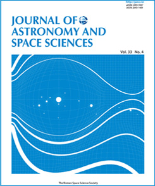
Journal of Astronomy and Space Sciences
Pioneering Insights into the Mysteries of Space.The Journal of Astronomy and Space Sciences, published by the Korean Space Science Society, is a premier open-access platform dedicated to advancing the fields of astronomy, astrophysics, and space sciences. Established in 1984, the journal has been instrumental in disseminating high-quality research findings, fostering collaboration among scientists globally, and providing insights into the dynamics of our universe. With an ISSN of 2093-5587 and an E-ISSN of 2093-1409, the journal has gained notable recognition, currently ranking in the Q3 quartile in Earth and Planetary Sciences and Physics and Astronomy as of 2023. Although the journal's H-Index is currently unspecified, its commitment to rigorous peer-review processes and open-access availability ensures that groundbreaking research is accessible to a wide audience. Based in Seoul, South Korea, the journal is poised to continue supporting innovative research through 2024 and beyond. Researchers, professionals, and students alike will find valuable resources and opportunities within its pages, further establishing this journal as a crucial resource in the exploration of the cosmos.

Journal of the Korean Astronomical Society
Charting New Frontiers: The Pulse of Astronomical ResearchWelcome to the Journal of the Korean Astronomical Society, an esteemed publication dedicated to advancing the fields of Astronomy and Astrophysics as well as Space and Planetary Science. Established in 1993 and under the reputable auspices of the Korean Astronomical Society, this journal serves as a vital platform for researchers and scholars from South Korea and around the globe to disseminate innovative findings and critical insights. With a commendable Q2 ranking in Astronomy and Astrophysics and a Q3 ranking in Space and Planetary Science, this journal is positioned among the influential voices in its fields, fostering collaboration and knowledge exchange. The journal's rigorous peer-review process ensures that published works contribute significantly to ongoing discussions and developments in astronomical research. While currently not an open-access journal, it remains accessible to the academic community, encouraging readers to stay abreast of the latest advancements in the sciences that elucidate the universe's complexities. Join us in exploring the cosmos through cutting-edge research and scholarly discussion that propels the field forward.
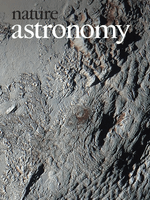
Nature Astronomy
Navigating New Frontiers: Essential Research for Tomorrow's Astronomers.Nature Astronomy, published by NATURE PORTFOLIO, stands at the forefront of the field of Astronomy and Astrophysics. Since its inception in 2016, this esteemed journal has rapidly ascended to a prestigious position, achieving a Q1 ranking in the Astronomy and Astrophysics category and securing an impressive 6th place out of 90 journals in the Scopus rankings, placing it in the 93rd percentile. With a focus on disseminating pioneering research, Nature Astronomy provides a vital platform for the dissemination of high-quality, impactful findings across various aspects of astronomical science. Researchers, professionals, and students alike will find a wealth of knowledge and innovative perspectives within its pages, enabling them to stay ahead in a rapidly evolving field. Although it does not offer open access, the journal's commitment to excellence and its influence in shaping the future of astronomical research make it an indispensable resource for anyone serious about advancing their understanding of the cosmos.

JOURNAL OF ASTROPHYSICS AND ASTRONOMY
Advancing Knowledge in Celestial Science.JOURNAL OF ASTROPHYSICS AND ASTRONOMY, published by the Indian Academy of Sciences, stands as a pivotal resource for researchers and professionals in the fields of astrophysics and astronomy, with a rich history of publication dating back to 1980. This esteemed journal aims to disseminate high-quality research, fostering advancements in how we understand celestial phenomena, space environments, and planetary sciences. With a current Impact Factor that places it in the Q3 category for both Astronomy and Astrophysics and Space and Planetary Science, it maintains a crucial role in the global academic community, particularly within India. Although not an open access journal, its scholarly contributions are vital for both emerging and established researchers striving to push the boundaries of our knowledge in the cosmos. The journal is indexed in Scopus, ranking 56th in Astronomy and Astrophysics and 72nd in Space and Planetary Science, reflecting its ongoing significance and reach in the scientific dialogue.

Journal of High Energy Astrophysics
Transforming Understanding: High-Energy Astrophysical BreakthroughsThe Journal of High Energy Astrophysics, published by Elsevier, is a premier platform for groundbreaking research in the fields of astrophysics and high-energy phenomena. With an ISSN of 2214-4048 and an E-ISSN of 2214-4056, this journal has quickly established itself as a leader since its inception in 2014. Operating out of the Netherlands, it is recognized for its rigorous peer-review process and high-quality publications, earning an impressive Q1 ranking across multiple domains, including Astronomy and Astrophysics, Nuclear and High Energy Physics, and Space and Planetary Science in 2023. With a Scopus rank of 12 out of 90 in the Astronomy and Astrophysics category, and being positioned in the 87th percentile, the journal plays a pivotal role in disseminating advancements and fostering collaboration among researchers, professionals, and students. Though the journal is not open access, it offers robust subscription options for institutions and individuals seeking to dive into the latest discoveries and theories in high-energy astrophysics.
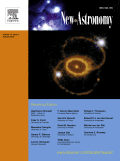
NEW ASTRONOMY
Innovating Research in the Realm of the StarsNEW ASTRONOMY, published by Elsevier, stands as a pivotal platform in the field of Astronomy and Astrophysics. With an ISSN of 1384-1076 and an E-ISSN of 1384-1092, this journal has solidified its reputation over its operational years, from 1996 to 2025. Located in the Netherlands, it ranks in the Q2 category for Astronomy and Astrophysics and Instrumentation, and Q3 for Space and Planetary Science, affirming its significant contribution to these disciplines. With a Scopus rank of #37/90 in Astronomy and Astrophysics and a respectable 59th percentile, this journal is essential for researchers and professionals seeking cutting-edge findings and methodologies. Although not open access, NEW ASTRONOMY remains dedicated to providing a rich repository of knowledge, featuring exceptional peer-reviewed articles that explore novel astronomical phenomena and advancements in instrumentation. Engaging with this journal will not only enhance your understanding of current trends in the cosmos but also contribute to the ongoing dialogue within these dynamic fields.